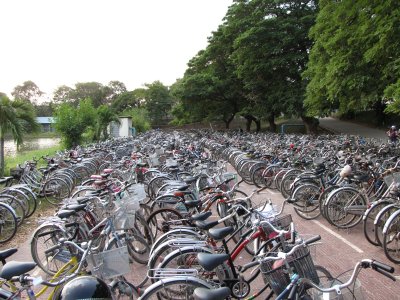Professor helps Cambodian university establish climate change program
"When most Americans hear the word 'Cambodia,' they think only of the Khmer Rouge genocide," says Mart Stewart, a professor in the Department of History at Western Washington University. "But this was only a momentary aberration in Cambodian history, and one that shared in the general madness in Southeast Asia during what the Vietnamese call ‘the American War.'"
Cambodia is more significantly Angkor Wat and deep traditions of culture and the arts, Stewart says.
"It's also a gloriously optimistic generation of young people who are remaking Cambodia as we speak."
Stewart talked with some of these young people during a month-long Fulbright Senior Specialist appointment in the Department of Resource Management and Development at the Royal University of Phnom Penh in Phnom Penh, Cambodia, in January. He also worked with their mentors as part of a curriculum-development team that is creating a new interdisciplinary graduate science program in climate change studies at RUPP. Stewart put together a course module and syllabus on the history of climate change politics and governance and collected relevant resources for the program.
Cambodia is currently suffering from an extended drought that is a rehearsal for future climate events. The drought has reduced the number of rice crops farmers can produce, affected water levels in the nation's rivers and, most significantly, damaged the productivity of the Tonle Sap fisheries – the heart of food security in Cambodia. Cambodia is ranked by several international indices as one of the most vulnerable to future climate change events, because more than 80 percent of the population depend on agriculture and the weather patterns that support it for their livelihoods. At the same time, Cambodia has contributed almost nothing to global carbon emissions; those there will suffer from a global environmental problem in which they have had no part in causing. In spite of rapid deforestation in the recent past, Cambodia’s forests also continue to be a substantial carbon sink.
Cambodian leaders recognize that adapting to climate change will require attention to a complex array of social and cultural factors. Climate change adaption will be inseparable in many cases from fisheries management, the development of more resilient kinds of agriculture, forest protection and reforestation initiatives, poverty alleviation and a range of social and political issues. Responding to climate change challenges will also require complex partnerships of local, national and international organizations and resources in addition to important leadership on the ground to foster these partnerships. In Cambodia and in other countries faced with major adaptations to climate change, climate change governance may well be as complicated as climate change science.
The Royal University of Phnom Penh is the oldest and most important public university in Cambodia. When the Khmer Rouge in 1975 were able to gain control of Phnom Penh after the Vietnam War had de-stabilized the region, they removed the Phnom Penh population to the countryside in an effort to establish an agrarian society. Then they executed most of the university’s administrators, faculty and students before closing the school. Educated Cambodians who survived the Khmer Rouge genocide mostly left the country as soon as they could, after a Vietnamese invasion ended the genocide in 1979. The removal of educated Cambodians and the subsequent isolation of Cambodia also meant that the university was slow to recover. In the past 15 years, however, it has grown rapidly. Though it still operates on a shoestring, it now has about 20,000 students and is the backbone of an invigorated educated system in Cambodia – a country with an average age of about 28.
The new master's degree in science program at RUPP is intended to serve the employees of Cambodian government agencies and the Cambodian employees of international NGOs and civil society organizations who are creating climate change adaptation strategies for Cambodia.
"The energy and talent is there," Stewart says. "Education is the pathway."
Professor Stewart has had three previous Fulbright appointments in Vietnam and has conducted research and taught in Southeast Asia for 20 years. He is also an affiliate professor in Western's Huxley College of the Environment.
